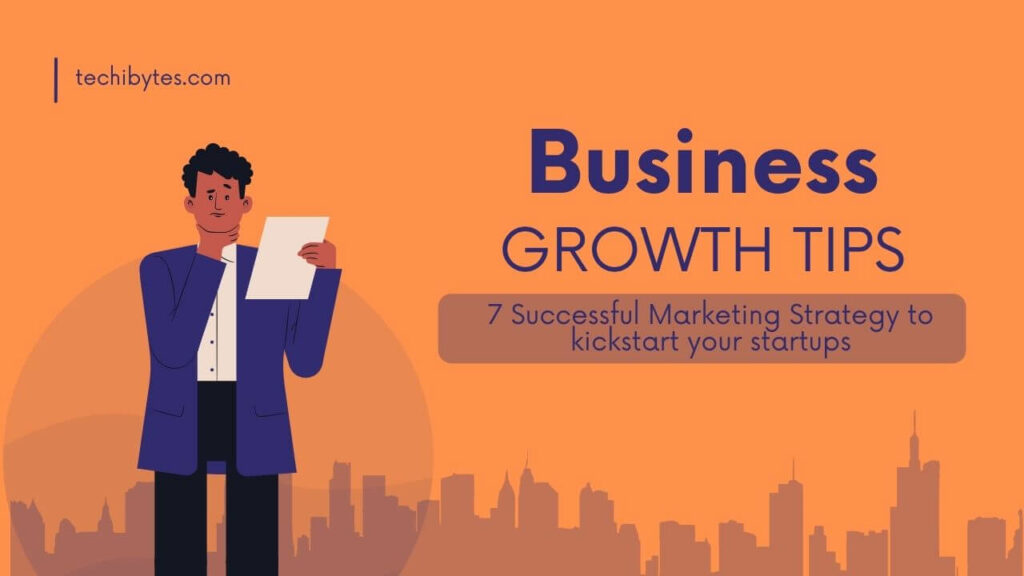Marketing has transformed at a breakneck rate. According to some marketers, marketing has evolved more in the last two years than it has in the preceding 50 years.
Nowadays, the majority of startups utilize internet marketing. Although some digital marketing tools are more effective than others, they are not all equally effective. Certain digital marketing strategies are on target, while others fall short.
Do you know which digital marketing approach to use to help your business grow? This post will explain what marketing strategies are, how they work, the benefits, the different types, and the proven seven successful marketing strategies for startups.
To begin, let us attempt to comprehend what marketing strategy is all about…
What Is the Definition of a Marketing Strategy?
A marketing strategy is a business’s overarching game plan for attracting and converting prospective customers to clients of its products or services. A marketing strategy includes the company’s value proposition, important brand message, demographic information about its target customers, and other high-level aspects.
A well-defined marketing strategy should center on the firm’s value proposition, which explains to customers what the company exists for, how it runs, and why it merits their business. This offers marketing departments a framework for all of the company’s goods and services.
Advantages of Developing a Marketing Strategy
The ultimate objective of marketing strategies is to establish and communicate a lasting competitive advantage over competing businesses via knowledge of their consumers’ requirements and desires. Whether it’s a print advertisement, mass customization, or a social media campaign, the effectiveness with which a marketing asset conveys a company’s primary value proposition may be measured. Moreso, there is a simplified WhatsApp marketing strategy to grow businesses that business owners can leverage.
Market research may assist in determining the effectiveness of a particular campaign and in identifying untapped consumers to meet bottom-line goals and improve revenues.
Why Is My Business in Need of a Marketing Strategy?
Marketing strategies assist a business in allocating its advertising money to areas where it will have the most impact. According to research, businesses having a defined marketing plan were 313 percent more likely to declare marketing campaign success. It is more obvious that businesses in the 21st century cannot avoid marketing because there are so much competition in the market and people really need to know about your product or service to request it.
How Should a Marketing Strategy Look?
A marketing plan will outline the advertising, outreach, and public relations activities that a business will do, as well as how the organization will assess the effectiveness of these operations. They will frequently adhere to the “four P’s.” A marketing plan’s functions and components include market research to inform price choices and new market entry.
A tailored message that is directed at certain demographics and geographic regions, platform choice for service and product promotion—digital, radio, Internet, trade magazines—and the combination of those channels for each campaign, and analytics that track the success of marketing initiatives and their reporting schedules.
What Do the Four Ps Mean in Marketing?
Product, price, promotion, and placement are what the “four P’s.” stands for. These are the critical aspects in the marketing of a product or service. The four P’s can be used to design a new business endeavor, evaluate an existing offer, or maximize sales to a specific audience. Additionally, it may be utilized to evaluate an existing marketing plan with a new audience.
What Is the Difference Between a Marketing Strategy and a Marketing Plan?
Because a marketing plan is established in conjunction with an overarching strategic framework, the phrases marketing strategy and marketing plan are frequently used interchangeably. In certain circumstances, the strategy and plan are combined into a single document, particularly for smaller businesses that typically execute just one or two significant campaigns each year. The marketing plan details monthly, quarterly, or yearly marketing efforts, whereas the marketing strategy details the entire value offer.
Various kinds of marketing strategies
Numerous marketing strategies are available. Developing a marketing plan entails examining your unique business needs, your target audience, and the specifics of your products.
In terms of marketing strategies, there are two main categories:
- Business to business (B2B) marketing
Businesses that operate on a B2B basis sell their product or service directly to other companies. Or, to put it another way, they sell to the policymakers in any given firm. This might range from restaurant table management software to business solutions to office chairs. There are a few B2B Seo marketing strategies for startups and small businesses to apply and drive sales. - Business to consumer (B2C) marketing
Businesses that sell to consumers provide items and services to individuals. This can include cruises, apparel, automobiles, and gardening services, among other things. Business to consumers (B2C) marketing is the most prevalent type of marketing.
Other forms of marketing strategies include the following: - Paid promotion
This involves a variety of marketing strategies. It encompasses more traditional methods such as television commercials and print media advertising. Additionally, online marketing is a well-known method of marketing. It encompasses a variety of techniques like PPC (Pay per click) and paid advertising. - Marketing for a cause
Cause marketing connects a business’s services and goods to a social cause or concern. Additionally, it is referred to as cause-related marketing. - Marketing based on relationships
This form of marketing is primarily concerned with consumer acquisition. Enhancing current consumer connections and increasing customer loyalty. - Secret marketing
This form of marketing strategy is focused on promoting the product while keeping the marketing strategy hidden from the customer. Covert marketing is a term that is frequently used to describe this practice. - Oral communication
As a result, it all comes down to how your actions are seen by others. Historically, it has been the most critical form of marketing approach. In the commercial world, it is critical to be heard. When you provide superior service to your consumers, they will probably recommend you. - Internet promotion
Additionally, it is referred to as cloud marketing. It often occurs over the internet. All marketing materials are shared online and marketed on a variety of channels using a variety of strategies. - Relationship marketing
Sales are one of the most difficult jobs. Much for the largest shops, selling is always difficult, even more so when volume requirements are involved. However, with modern marketing methods, selling is no longer as challenging as it once was.
Retailers use transactional marketing to entice customers to purchase through shopping coupons, discounts, and large-scale events. It increases the likelihood of a sale and encourages the target audience to purchase the marketed items. - Diversification of marketing
Personalizing and combining various marketing methods, appeals to a varied clientele. It encompasses a variety of facets, including cultural, religious, and philosophical ideas, attitudes, and perspectives, as well as other specialized demands.

Marketing Strategies
1. Define Specific Objectives and Key Performance Indicators
Any marketing plan should begin with the establishment of goals that accurately reflect your objectives. They might be short-term or long-term objectives. You may also categorize them according to the outcome – an increase in sales and revenue, an improvement in SEO rankings, or entry into a new market, for example. Associating these objectives with the rest of your company plan is critical.
Once you’ve determined what you’re aiming toward, you’ll need to describe how you’ll determine success. This involves the establishment of pertinent Key Performance Indicators (KPIs) to monitor your success.
Several metrics that you might add to your report depending on activity include the following:
Sales & Leads — The number of new leads, the conversion rate, the cost per conversion, and the net promoter score, among other metrics.
Organic traffic, new and recurring visitors, the average length of time on page, bounce rate, goal closure, events, keyword rankings, page authority, and so on.
Social media ROI, engagement rate, amplification rate (or how many of your followers genuinely engage with your material), social media conversion rate, and so on.
Cost per acquisition, lead generation, and conversions through sponsored advertising.
If you’re unsure of your marketing skills or your team lacks them, contact an experienced marketing agency to assist you in getting started. With some external assistance, you may establish the appropriate goals and strategies to avoid marketing failure.
2. Define Your Audience
The more information you have about your audience, the more easily you can target them. Understanding your target consumers’ requirements and desires may help you establish a stronger connection with them, increase brand trust and loyalty, and optimize your marketing plan.
When your target demographic is defined, you can develop a solid action plan for successfully approaching them and acquiring new clients.
Conduct research and collaborate with your team to develop buyer persona profiles that are based on distinct sets of criteria for each step of the purchasing funnel. This will assist you in becoming more acquainted with the people you are attempting to reach and inappropriately targeting them.
3. Pay Close Attention to Search Engine Optimization and Content Marketing
Search engine optimization (SEO) is a critical component of any marketing plan. It’s a completely free and intelligent approach to contacting your target audience by allowing them to discover you naturally. With an effective content marketing plan in place, you can generate and promote helpful and unique material that will aid in the indexing of your pages for specific keywords.
Achieving a position in the top search engine results pages (SERPs) demonstrates that your website is a significant source of information. This instills consumer trust in the company, therefore establishing trust and authority.
To improve your search engine optimization, your site should be well-organized. Its pages should be appropriately labeled and connected thematically. This guarantees that anytime a buyer searches for a product similar to the one you provide, they can quickly locate and navigate to your website. Additionally, it ensures that search engines understand the precise content on your site and how it ties to other sites.
4. Invest in email marketing.
Email marketing is an excellent way to begin growing your startup’s network and establishing a strong digital presence. However, it is not as simple as writing an email. It is a long-term approach that needs meticulous preparation and continuous review and improvement.
This includes developing a targeted email template capable of delivering your message to the appropriate customers. The material should be written in the buyer’s language and represent the various stages of their shopping experience. It must be targeted, personalized, and tailored to your audience’s unique needs.
You should establish some metrics to gauge the success of your email marketing strategy. For instance:
Keep track of click-through rates, open rates, and forward rates, among other metrics.
Determine the proper frequency of emailing – once a month, once a week, or once every two weeks, for example.
Look at the size of your mailing list and employ sensible strategies to expand it – for example, provide a subscribe form on every page of your website.
Additionally, you should measure and evaluate website conversions generated by email traffic.
You may change your content and strategy based on this data to guarantee your followers are engaged.
5. Develop a Vibrant Social Media Strategy
Are you aware that your clients spend around two hours every day on social media? How will you stand out in a sea of companies vying for customers’ attention?
Social media is so much more than a tool for brand recognition. It establishes a two-way dialogue with your audience and enables you to learn more about them. It’s an excellent source of feedback, and it may also provide insight into areas where your product or service could be improved.
Consider the following points while developing an amazing social media presence:
Adopt a distinct strategy for each social media platform – Determine your consumers’ locations and develop a strategy for each network you want to use. Distribute material that simplifies their engagement with your brand. Increase your exposure by including links to your website and cross-promoting your other social media platforms.
Take what you’ve learned and apply it – Performance analytics are available on any social media site and may be used as a hidden weapon to achieve success. Social media analytics may offer you information about your audience’s involvement, preferences, demographics, and interests. You may segment your clients and launch targeted advertising for certain groups based on this information.
Be fearless of reviews – Encourage your consumers to express their experiences on social media. Buyers seldom consider leaving a review unless they are specifically prompted to do so.
6. Host a Giveaway and Provide a Free Trial
Because your brand is new, customers may be distrustful of your offerings. As a result, it’s natural that people first distrust you. Therefore, how about gifting them something complimentary to help break the ice?
Pamper your initial prospects with a complimentary version of your goods or service. Additionally, depending on the nature of your business, you can provide unique incentives or rewards to first-time purchasers. By providing praises, you will surprise and delight your consumers.
As a company, one of your objectives is to develop a loyal following, and this is an excellent approach to getting feedback and initial evaluations. You can determine which elements they appreciate the most and which ones you can enhance.
Offering free plans and trials complements your marketing strategy since it enables you to begin gathering lead data for future marketing and advertisements.
Additionally, you may create a giveaway and generate buzz around it by working with a larger company in your sector that can assist with advertising. This will improve brand recognition since you will be able to connect with their audience as well.
7. Promote Your Business Through a Referral Program
Referrals, or so-called word-of-mouth marketing, are a very effective method of generating interest in your items. This notion says that satisfied consumers will promote your brand to their networks. They will act as advocates for your business, promoting it. If they generate new leads for you, they are compensated with discounts on your goods or other perks.
Referral marketing strategies are effective, according to statistics, since they:
83 percent of purchasers rely on product recommendations from friends and family.
B2B enterprises that receive referrals convert at a rate of 70% greater than those who do not.
Referral leads convert 30% more effectively than leads generated through other methods.
FAQ
How can I market my new business?
You may advertise your beginning firm using a variety of marketing strategies. For instance, SEO is an effective approach for increasing organic traffic to your website. Social networking is another critical channel for spreading the word about your business. If you have the funds and are looking for instant results, advertising can assist you in generating immediate leads.
What are some finest startup marketing practices?
As discussed previously, SEO, content marketing, and social media marketing are all excellent examples of startup marketing best practices. All of them are relatively inexpensive marketing methods that provide excellent results.
How critical is marketing to the success of a startup?
Marketing is critical for a startup since it is required to raise awareness about the firm. As a new firm, you must educate your prospective clients about your products and services, and digital marketing is the best method to do it.
What are the best methods for social media marketing for startups?
The first and most critical best practice is to get started correctly and develop a strong social media marketing strategy. This should contain your objectives, platform selection, competitive research, and content strategy, among other things. Additionally, you should establish a brand voice that will be used consistently throughout all of your social media posts.
Conclusion
If you want to expand your startup, you must begin with imaginative marketing. Rather than simply increasing spending on conventional advertising and digital media, consider thinking outside the box to get significant outcomes.
If you’re financing a business from scratch, you’ll need to establish yourself as the most active account and provide content that encourages others to know about your product. Businesses that are having difficulty attracting new visitors and users consistently can consider offering an incentive. This might be accomplished through contests, bonuses, or even direct payment.
To increase your boost even further, consider creating a piece of information that becomes massively popular. The most popular example is a video, but it could be anything. Offline marketing is a time-tested way of growing your brand, even if it is entirely online.
Simple promotional materials, such as tee shirts and bumper stickers, can help you achieve celebrity. Establishing important relationships with other businesses and newspapers may also give a significant boost, providing you with vast reach at a minimal cost.
Finally, communicate with cold prospects. These might be potential users, influencers, or anyone who would be enthusiastic about your product.
If you liked this article, then please subscribe to our YouTube Channel for WordPress video tutorials. You can also find us on Twitter and Facebook










